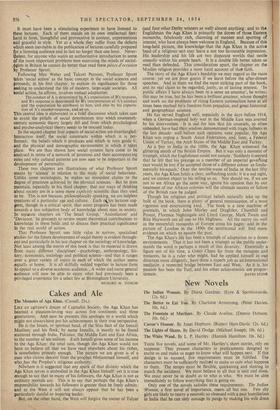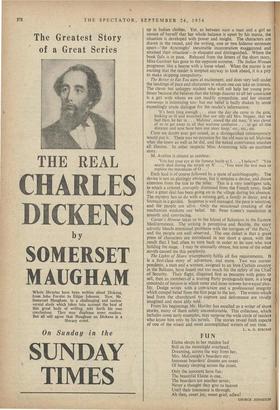New Novels
THESE five novels, and some of Mr. Hartley's short stories, rely on suspense. They present characters in predicaments designed to excite us and make us eager to know what will happen next. If this design is to succeed, five requirements must be fulfilled. The characters must be sufficiently realised to make us care what happens to them. The tempo must be flexible, quickening and slowing to Match the incidents. We must believe in all that is said and done. We must never be in doubt as to who is who. We must be able immediately to follow everything that is going on.
Only one of the novels satisfies these requirements. The Indian Woman, a first novel of importance, meets all but one. Few shy girls are likely to marry a neurotic so obsessed with a past humiliation in India that he can only assuage its pangs by making his wife dress
up in Indian clothes. Yet, as between sucn a man and a girl so unsure of herself that her whole balance is upset by his mania, the situation is developed with power and insight. The characters are drawn in the round, and the writing, one or two hideous sentences apart= the Ayscoughs' inexorable incarceration exaggerated and strained their situation'—is eloquent and distinguished. Where the book fails is in pace. Released from the fetters of the short story, Miss Gardner has gone to the opposite extreme. The Indian Woman progresses like a hearse with a loose wheel. When the matter is so exciting that the reader is tempted anyway to look ahead, it is a pity to make skipping compulsory.
The Better to Eat You aims at excitement, and does very well under the headings of pace and characters in whom one can take an interest. The clever but unhappy student who will ndt help her young pro- fessor because she believes that she brings disaster to all her associates is a girl with whom we can readily sympathise, and her sinister entourage is interesting too: but our belief is badly shaken by some exceedingly crude dialogue for the reader's information: 'It's been long enough . . . since the day she came to the gate, looking so ill and wretched that our silly old Mrs. Nepper, that we had then, let her in . . Malvina', cooed the old man, 'it was clever of us to get away in all that wartime confusion . . . to get all this distance and now have here our inner keep,' etc., etc., etc.
Coos we doubt ever got cooed, as a distinguished contemporary would put it. There was no occasion for the old man to tell Malvina what she knew as well as he did, and the naked contrivance smashes all illusion. In .other respects Miss Armstrong tells an excellent story.
M. Aveline is almost as careless:
'You lost your eye at the famous battle at L I believe?' You nearly died during the attack on X' ..., 'You were the first man to explore the mountains of 0 ...'
Each lead is of course followed by a spate of autobiography. The device is not so glaringly obvious, but it remains a device, and draws attention from the tale to the teller. This is a very intelligent tale, in which a colonel, corruptly dismissed from the French army, finds that a great deal has been going on in the village during his absence. The mystery has to do with a missing girl, a family in decay, and a fountain in a garden. Suspense is well managed, the pace is sensitive, and the people are alive. Only the occasional creaking of the mechanism weakens our belief. Mr. Peter Green's translation is smooth and convincing.
Caesar's Honour takes us to the Island of Salonicos in the Eastern Mediterranean. The writing is perceptive and flexible, the story adroitly blends emotional problems with the intrigues of ' the Party,' and the people are well observed. The one defect is that a great press of characters are introduced in too short a space, with the result that I had often to turn back in order to be sure who was holding the stage. I may be unusually obtuse, but none of the other novels caused me this perplexity.
The Lights of Skaro triumphantly fulfils all five requirements. It is a first-class story of adventure, and more. Two war corres- pondents, a man and a woman, assigned to an Iron Curtain country in the Balkans, have found out too much for the safety of the Chief of Security. Their flight, disguised first as peasants with goats to sell, then as members of a touring Party propaganda team, is a long crescendo of tension in which outer and inner stresses have equal play. Mr. Dodge writes with a conviction and a professional integrity which compel belief from the first page to the last. The events which lead from the churchyard to capture and deliverance are vividly imagined and most ably told.
From his beginnings Mr. Hartley has excelled as a writer of short stories, many of them subtly uncomfortable. This collection, which includes some early examples, may surprise the wide circle of readers who know hirn only by his novels. The stories reveal fresh aspects of one of the wisest and most accomplished writers of our time.
L. A. G. STRONG



































 Previous page
Previous page